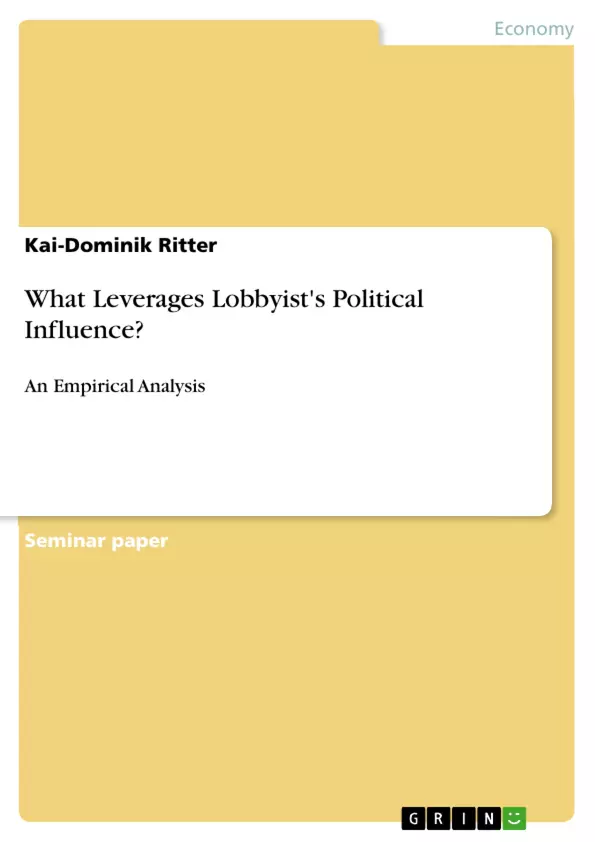Recent political alarm signals make Lobbying as a research field highly relevant. The main objective is to challenge common approaches to model the mechanisms of how lobbyists gain political influence. I will explain what parameters or factors makes lobbyists more successful in their aim to influence political decision makers and what “channels” they use to do so. This issue is closely related to the question of what makes incumbents prone to lobbyists’ activities.
This paper starts with a short theoretical introduction to rent seeking games, which are the theoretical underpinning of a school of thought which models lobbying as a kind of political investment through well-aimed campaign contributions. I question the conjecture that financial contributions are the main leverage for lobbyists to gain political influence and provide empirical data which support my claim. My analysis focuses on the total amount of money, which is transferred from U.S. interest groups to U.S. politics and could be understood as political investment through campaign financing. To explain my findings in this context, the question is addressed whether political donations do have a measurable effect on political decisions.
In the second part of the paper another popular interpretation of a lobbyist’s main instrument to influence is discussed: The provision of special knowledge. Empirical analysis shows that the data delivers strong evidence to reject this idea. Instead, I develop a new way of interpreting the meaning of “special knowledge” by asking what advantage a politician has to socialise with lobbyists. By focusing this question in more detail a theoretical model is introduced which shows how important the concerns of special interest groups could be for politicians in their aim to become reelected. This model leads to the final result of this paper:
What makes lobbyists useful to politicians and therewith powerful is the provision of private information about preferences of possibly pivotal constituents.
Inhaltsverzeichnis (Table of Contents)
- Introduction
- The Political Investment Approach
- Focusing the Effect of Financial Contributions
- Theory: Rent-Seeking Games
- Empirical Findings: Financial Contribution as Leverage
- The Consulting Approach
- The Role of Individual Relationships
- Empirical Findings: Expert Knowledge as Leverage
- Why Incumbents Benefit from Lobbyist's Influence
- A Theoretical Model by Lohmann
- Empirical Findings: Electoral Cycles and Influence of Interest Groups
- Conclusion
Zielsetzung und Themenschwerpunkte (Objectives and Key Themes)
This seminar paper aims to challenge conventional approaches to modeling how lobbyists gain political influence. It analyzes the factors that contribute to lobbyists' success and investigates the “channels” they utilize to influence political decision-makers. Furthermore, the paper delves into the question of what makes incumbents susceptible to lobbyists' activities.
- Examining the role of financial contributions in lobbyist influence.
- Assessing the impact of "special knowledge" provided by lobbyists.
- Developing a theoretical model that explains the importance of private information about voter preferences for politicians.
- Exploring the role of electoral cycles in the influence of lobbyists.
- Analyzing the leverage of lobbyists based on the provision of private information about voter preferences.
Zusammenfassung der Kapitel (Chapter Summaries)
- Introduction: This chapter introduces the research question and its relevance, highlighting the lack of transparency in the German lobbying system and the focus on U.S. lobbying datasets. The paper's main objective is to analyze the mechanisms by which lobbyists influence political decision-makers and the factors that contribute to their success.
- The Political Investment Approach: This chapter critiques the common understanding of lobbying as a market for political influence, emphasizing the inefficiencies and deadweight losses caused by lobbyists' influence on political decisions. It introduces the theoretical underpinnings of rent-seeking games and discusses the role of financial contributions as a leverage for lobbyists.
- The Consulting Approach: This chapter focuses on the role of special knowledge provided by lobbyists as a means of influence. It analyzes empirical data that challenges the idea that special knowledge is a primary source of influence and proposes an alternative interpretation.
- Why Incumbents Benefit from Lobbyist's Influence: This chapter presents a theoretical model that explains how incumbents can benefit from the provision of private information about voter preferences by lobbyists. It argues that this information can be crucial for maximizing reelection probabilities.
Schlüsselwörter (Keywords)
Lobbying, political influence, rent-seeking games, campaign contributions, special knowledge, private information, voter preferences, electoral cycles, incumbents, interest groups, political decision-making.
Frequently Asked Questions
What is the primary source of a lobbyist's power?
The paper concludes that the provision of private information about the preferences of pivotal constituents is what makes lobbyists most useful and powerful to politicians.
Do financial contributions guarantee political influence?
The author questions the common assumption that campaign contributions are the main leverage, providing empirical data that suggests money is not the only or most effective channel.
What is the "Consulting Approach" in lobbying?
This approach suggests lobbyists gain influence by providing expert knowledge. However, the paper finds evidence to reject the idea that simple "expert knowledge" is the primary source of leverage.
Why are politicians susceptible to lobbyists?
Politicians, especially incumbents, are driven by the goal of reelection. Lobbyists provide crucial data on voter concerns that help politicians maximize their chances of winning.
What are "Rent-Seeking Games"?
Rent-seeking games are a theoretical framework used to model lobbying as a political investment where interest groups seek to gain benefits through targeted contributions.
- Citar trabajo
- Kai-Dominik Ritter (Autor), 2014, What Leverages Lobbyist's Political Influence?, Múnich, GRIN Verlag, https://www.grin.com/document/271911



